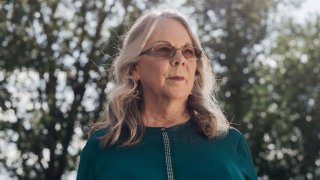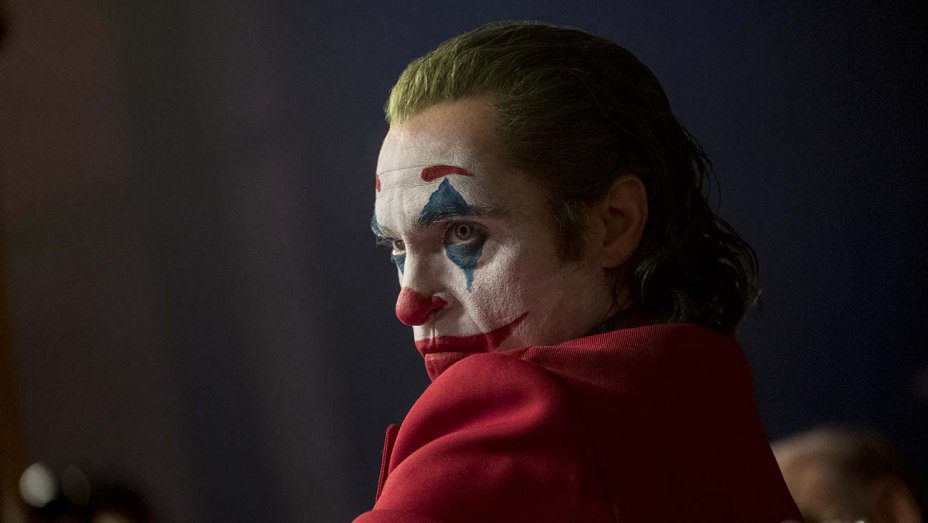Warner Bros. Pictures
Though supportive of their goals, the Hollywood Reporter columnist (and gun owner) argues that survivors of shootings are targeting the wrong film with the wrong strategy, “setting a bad precedent for all activist groups.”
In Alan Moore’s brilliant graphic novel, Batman: The Killing Joke, the Joker justifies his psychopathic behavior by philosophizing that every human being is just “one bad day away” from rejecting the polite veneer of civilization’s morality in the face of an indifferent universe. To him, we are all amoral sleeper agents awaiting the secret code word to awaken us to selfish violence.
Yet, even if the universe is indifferent, most people are not.
We share each other’s grief and try to lighten each other’s burdens caused by that “one bad day.” And so we continue to grieve with and support the survivors and victims’ families like those of the 2012 Aurora, Colorado, shooting during a screening of The Dark Knight Rises that killed 12 and wounded 70 others. But, while their campaign against Joker and Warner Bros. may evoke our sympathies, it is counterproductive to their goal as it sets a bad precedent for activist groups trying to define the boundaries between free speech, hate speech and violence-promoting speech.
The Aurora group, Survivors Empowered, have made it clear that they aren’t asking the studio not to release the film, nor are they promoting a boycott. Instead, they asked Warner Bros. to donate to groups that help victims of gun violence, to “end political contributions to candidates who take money from the NRA and vote against gun reform,†and to “use your political clout and leverage in Congress to actively lobby for gun reform.†Despite being a gun owner myself, I fully support the Aurora group’s goals of promoting aggressive gun reform by pressuring the members of Congress who are generous with “thoughts and prayers†but miserly with actions that might actually curtail the epidemic of mass shootings — especially when they’re getting millions of dollars in political contributions from the NRA and gun manufacturers.
One can only imagine the intensity of the anger and frustration of the Aurora people to see seven years pass with very little change except the body count. So far in 2019 alone, as of Sept. 24, there have been 334 mass shootings (1.24 per day) with 377 dead and 1,347 injured. In just nine months.
‘Joker’ Final Trailer
However, though I am supportive of their goal, this is the wrong movie and the wrong strategy to promote the fight for gun control because it creates a diversion. First, the strategy is wrong because it feels uncomfortably close to passive extortion. Even though there is no call to boycott, they have cast a pall over the film that is meant to be damaging. No matter how Warners reacts, the damage has already been done. Even if Warners complied with their demands, the movie has been tainted in the eyes of the average moviegoer. A photo of a Warner Bros. executive handing them a large check wouldn’t change that. There’s therefore no incentive for the studio to comply. In fact, according to a Warner Bros. statement in response: “Our company has a long history of donating to victims of violence, including Aurora, and in recent weeks, our parent company joined other business leaders to call on policymakers to enact bipartisan legislation to address this epidemic.â€
Second, Warner Bros. and Joker are the wrong focus of attention, which further compromises the group’s goal. Despite their claim that “we support your right to free speech and free expression,†launching this campaign around a movie — especially one like this that strives to be more artistic than exploitative — can have a chilling effect on free expression. Especially when one of the writers of the letter described the film as a “slap in the faceâ€: “My worry is that one person who may be out there — and who knows if it is just one — who is on the edge, who is wanting to be a mass shooter, may be encouraged by this movie. And that terrifies me.†Her emotion is understandable, but her reasoning is not. And since she is using her reasoning to persuade the rest of us, it needs to be examined.
Though movies (Taxi Driver for John Hinckley Jr., would-be assassin of Ronald Reagan), books (The Catcher in the Rye for Mark David Chapman, John Lennon’s murderer) and songs (“Helter Skelter†for Tate-LaBianca murders mastermind Charles Manson) may articulate specific criminals acts, they don’t inspire the person’s desire for violence. Science has proven that in numerous studies. It’s tempting to blame movies, video games and rap music because they often express humanity’s worst impulses, but impulses are not actions for most of us. And for the mentally ill seeking violence, anything can set them off. Alek Minassian, the self-described incel (involuntary celibate) who deliberately drove his van into a crowd in Toronto in 2018, killing 10 people, said he was motivated by his resentment toward women for having sexually rejected him in favor of giving “their love and affection to obnoxious brutes.†Should we then demand that studios producing romantic comedies and publishers of romance novels be shamed into contributing to anti-incel causes? The 2017 Las Vegas shooter killed 59 and injured 851 during a country music festival. Should country music bear some responsibility?
I stand with Survivors Empowered and other organizations fighting for gun reform. And I’ve been a strong supporter of controversial activist strategies over the past 50 years. But we need to be effective so that we change the country for the better without curtailing the legitimate rights of others. As I have learned the hard way, social change is exceedingly slow and cautious, and moves at all only because we continually prod it to do so. We all seek peace, but as W.B. Yeats wrote, “Peace comes dropping slow.”
Kareem Abdul-Jabbar is an NBA Hall of Famer and contributing editor at The Hollywood Reporter.

READ MORE
Aurora Shooting Victims Voice Fears Over ‘Joker’ in Letter to Warner Bros.
A version of this story appears in the Oct. 9 issue of The Hollywood Reporter magazine. To receive the magazine, click here to subscribe.

